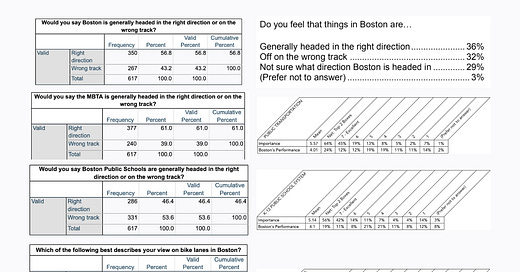Prepare for Mayor Wu's State of the City Speech: Comparing Emerson & BPI's polls
On Wednesday night Mayor Michelle Wu is giving her 2025 State of the City speech. BPI will have instant analysis of the speech after it finishes tomorrow night, but where do things stand in Boston heading into the speech?
To answer that question, BPI compared the recent public polling from Emerson College Polling conducted & released in February to polling conducted by BPI in April 2024. BPI’s analysis found four areas where BPI & Emerson asked questions about similar issues:
Right direction/wrong track;
Public transportation;
Boston Public Schools; and
Bike lanes.
The polls are about similar issues and the respondents in both polls are Boston residents. With 10 months between the polls, there was enough time for sentiment on at least one issue to noticeably improve. Here is how each poll asked its issue questions:
In its April 2024 poll, BPI asked respondents to rate a number of issues in two ways: how important it was to them; and how Boston was performing on the issue.
In its February 2025 poll, Emerson asked respondents right direction/wrong track questions on similar issues.
All four of those issues are likely to make an appearance in Mayor Wu’s speech tomorrow night, so keep reading for more!
RIGHT DIRECTION/ WRONG TRACK
Emerson & BPI’s polls had a similar sample size, and on one of the most important questions - right direction/wrong track - both polls asked very similar questions. Unfortunately, because Emerson did not allow for a “not sure” response, the questions cannot be exactly compared.
EMERSON’S RESULTS:
BPI’S RESULTS:

PUBLIC TRANSPORTATION
The first close to apples-to-apples comparison is public transportation.
Here there are again differences: Emerson asked a right direction/wrong track question about the MBTA, whereas BPI asked respondents to rate issues based on how “important that is when thinking about where to live,” and then on “Boston’s performance.”
BPI and Emerson’s results diverge significantly on this issue: in BPI’s poll, public transportation was a “High Importance / Low Performance” issue, whereas Emerson’s poll found respondents thought things were heading in the right direction. This makes a lot of sense given the strides the MBTA has made since BPI’s poll was done last year. Basiscally: there is a lot of reason to believe that the public would feel more positively about the MBTA after the year the system had.
This issue is also the least related to the mayoral race out of the four issues where there is overlap between BPI & Emerson. Boston does not oversee the MBTA and Mayor Wu’s major actions on public transit like offering free bus service had already been in place for several years at the time that BPI conducted the poll in April 2024.
EMERSON’S RESULTS:
BPI’S RESULTS:
BOSTON PUBLIC SCHOOLS
The next issue that BPI & Emerson both polled on was Boston Public Schools. Here again Emerson asked a right direction/wrong track question about BPS, whereas BPI asked respondents to rate “K-12 public school system” based on how “important that is when thinking about where to live,” and then on “Boston’s performance.”
This issue also fell into the “High Importance / Low Performance” category in BPI’s poll, but unlike the MBTA/public transportation question that meant BPI & Emerson broadly agree that Boston residents do not think that BPS is performing very well.
BPI also asked an additional set of questions about BPS, so BPI’s poll just has significantly more questions and responses that sheds light on why this number is so low in Boston. BPI’s polling is a good map for other pollsters looking to go into the field in Boston: BPI asked about school construction, per student spending, and a battery of school-related issues that all play a role in this number.
EMERSON’S RESULTS:
BPI’S RESULTS:
BIKE LANES
The last issue that both BPI & Emerson polled on was bike lanes.
Here again Emerson asked a right direction/wrong track question about bike lanes, whereas BPI asked respondents to rate “dedicated bus and bike lanes” in two different ways: how “important that is when thinking about where to live,” and then on “Boston’s performance.”
This issue highlights why BPI’s approach shed more light on where residents were at compared to Emerson’s poll: for BPI this issue was in the “Low Importance/ Low Performance” category. Emerson’s poll measures how respondents feel on performance, but did not ask whether it is important to them.
No matter the quibbles about question phrasing, it is clear that the mayoral campaigns think this issue is important: bike lanes were an early talking point for Josh Kraft & a focus of new City Hall policy for Mayor Wu.
EMERSON’S RESULTS:
BPI’S RESULTS:
Boston Policy Institute, Inc is working to improve the public conversation - help us by following BPI on YouTube, TikTok, Facebook, Instagram, Threads, Twitter, and LinkedIn.











